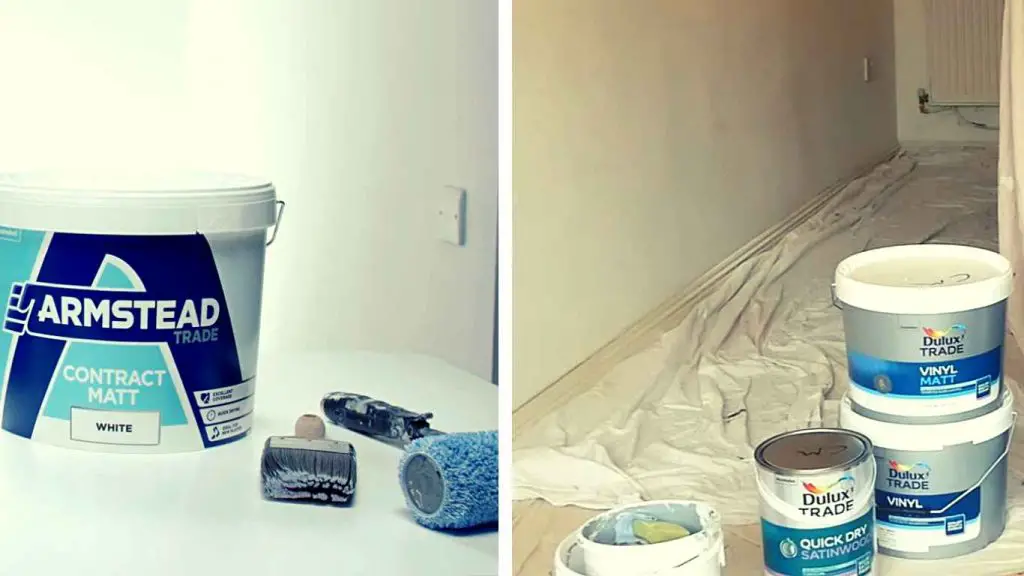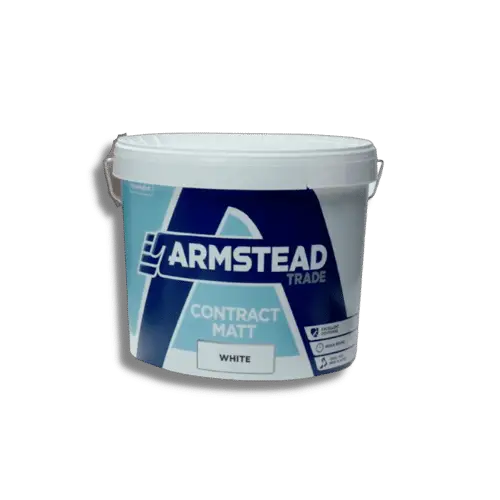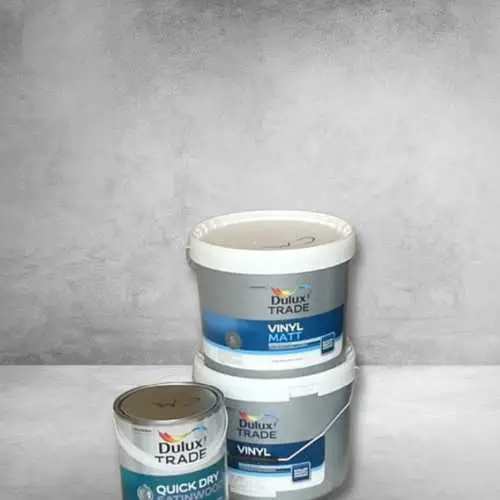For a sophisticated and exquisite look to their ceilings, walls, and most other interior designs, many individuals nowadays choose matte finishes around the world. Matt finishes are being increasingly often used to provide a more natural and neutral appearance. The appropriate finish for you is matte if you like more subtle appearances over glossy and shiny ones.
There are various types of matt that are available on the market. However, vinyl matt and contract matt are widely recognized as the best options for painting ceilings.
Due to their matt nature, both would impart a non-reflective finish to the surface where you will be utilizing them. Let’s now examine the differences between vinyl matt and contract matt and discuss some fascinating facts about these two well-known matt finishes.

What is Contract Matt?
Contract matt is a water-based emulsion that is applied to a number of surfaces, including brick, concrete, interior walls, and ceilings. Because it can be applied immediately to freshly plastered walls, it is often referred to as the “builders finish.”
Any surface that is covered in contract matt has a high degree of opacity and a very sharp matte finish. You only need to apply a few coats to achieve the desired effect due to its high opacity. Or, due to their porous nature, you can pretty much get your work down if you decide to just apply one coat of it.
They also have fewer polymer binders. They are therefore permeable and less problematic to attach to plasters when applied.
Additionally, contract matt is really inexpensive, so one can easily afford them. Contract matt is the best alternative for you if money is scarce.
Just as each coin has two sides, contract matt has their pros and cons as well. One of the drawbacks of contract matt is, it lacks durability. As a result, if dirt or debris sticks to it, it can’t be wiped off.

What is Vinyl Matt?
Another water-based emulsion commonly used for ceiling and wall paint is vinyl matt. It often produces a non-reflective, smooth finish. The vinyl matt finish is the least obvious low reflective finish out of all the other types of finish.
These emulsions are more durable since vinyl matt is typically created with vinyl resin. As a result, they are simple to apply and tend to provide interior walls and ceilings with a smooth finish. Also, you can check acrylic matt vs vinyl matt to get better ideas about this particular finish.
Vinyl matt is typically appropriate for usage in low-traffic areas such as dining halls, living rooms, and drawing rooms. Because these rooms often receive minimal traffic, a durable emulsion is not required for the walls.
Another intriguing aspect of vinyl matt is that it has a flat finish that offers the wall a nice finish and helps to conceal any flaws in the patterning, unsightly stains, or other imperfections in the wall.
Vinyl matt emulsion possesses high durability. As a result, if dirt or debris sticks onto the wall, you can wipe it off without affecting the matt finish.

Contract Matt vs. Vinyl Matt
Even though both contract matt and vinyl matt are water-based emulsions, they have some unique characteristics. Let’s look at some of the differences between vinyl matt and contract matt.
| Contract Matt | Vinyl Matt |
|---|---|
| In the formation of contract matt, no resin is used. | Vinyl matt usually are made with a resin called vinyl which makes these emulsions more hard-wearing. |
| Usually used as a base coat. | Can be applied as a base coat but is mostly used over the existing coats. |
| Lacks durability | Possess high durability |
| If any wall or surface area contains contract matt, it can’t be cleaned down if it gets dirty. | If any wall or surface area contains vinyl matt, it can’t be cleaned down if it gets dirty. |
| Ideal for ceilings, brick, plasterboards, and so on. | Ideal for living rooms, dine-in halls, and places with low traffic. |
| Very cheap | More expensive than the contract matt. |
| Can be directly applied to ceilings and walls. | Can be applied directly to walls but is mostly applied on existing contract matt coats. |
| Does not covers imperfect surfaces. | Covers imperfect surfaces and unwanted stains. |
| It is not washable | It is washable |
| Contains fewer polymer binders | Contains more polymer binders than contract matt. |
| It is very porous in nature. | It is not that much porous in nature. |
| Can’t be used over wallpapered ceilings. | Can be used over wallpaper but it is not recommended. |
| Has a subtle odor that is breathable. | Has a strong odor. |
| Not suitable to be used in kitchen and bathroom. | Suitable to be used in kitchen walls and bathrooms. |
Advantages and Disadvantages of Contract Matt
The advantages and disadvantages of contract matt are as follows:
| Advantages of Contract Matt | Disadvantages of Contract Matt |
|---|---|
| Contract matt has a very reasonable price | Contract matt lacks durability |
| Can be easily applied using a paintbrush, roller or airless spray can. | If any wall containing contract matt gets dirty, it can’t be cleaned down as the paint might come off. |
| Can be directly applied to ceilings and walls. | It does not cover imperfect surfaces of the wall. |
| Breathable emulsion with tolerable odor | It is not washable |
| Contains fewer polymer binders | Contract matt can’t be used over wallpapered ceilings |
| Can cover a big area, resulting in a professional finish that is perfect to use for brick, ceilings, fresh plaster, plasterboards, and other surfaces. | Not suitable to be used in kitchen and bathroom. |
| Have high opacity | Cannot be used on surfaces that go through condensation |
Advantages and Disadvantages of Vinyl Matt
The advantages and disadvantages of Vinyl matt are as follow:
| Advantages of Vinyl Matt | Disadvantages of Vinyl Matt |
|---|---|
| Vinyl matt is ideal for living rooms, dine-in halls, and in places with low traffic. | Vinyl matt has a strong odor. |
| It possesses high durability | They are more expensive than contract matt. |
| If any wall containing vinyl matt gets dirty, it can be cleaned down easily using a sponge or rug | Prone to get marks and other debris on the surface. |
| It covers imperfect surfaces and unwanted stains. | Not suitable for high moisture rooms |
| It is washable | Has susceptibility to scuffs |
| Suitable to be used in kitchen walls and bathroom areas. | Not compatible with all types of surfaces. |
| Resistant to damage | Not compatible to be used in high-traffic rooms and areas. |
The Bottom Line
Each type of matt, including vinyl and contract, has benefits and drawbacks. Contract matt may be your finest alternative if you’re seeking some less expensive options. On the other hand, vinyl matt is the one you should choose if you are willing to pay more money to get a matt finish that will endure longer on your interior walls and ceilings. But how you utilize these matte finishes will vary greatly depending on the kind of surface you’re using it on, whether it will be in a high- or low-traffic area, and how much of the surface you’ll be using it on. So, before selecting the appropriate matt for your needs, configure your preferences.

S. Pushon is a paint expert, self-taught artist, and currently working as an adviser in the paint industry as a Quality Improvement and Development Assistant.
An artist by heart, he draws remarkable art pieces and as a professional paint industry individual, he seeks the insight and shares with enthusiasts. Read more…

